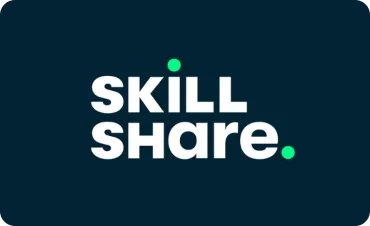When you enroll through our links, we may earn a small commission—at no extra cost to you. This helps keep our platform free and inspires us to add more value.

R Programming Bootcamp for Data Science and Machine Learning
Unlock creativity with Skillshare! Learn acrylic painting, AI writing, graphic design, and photography.

This Course Includes
 skillshare
skillshare 0 (0 reviews )
0 (0 reviews ) 26 hours 13 minutes
26 hours 13 minutes  english
english Online - Self Paced
Online - Self Paced course
course SkillShare
SkillShare
About R Programming Bootcamp for Data Science and Machine Learning
Introduction
R Installation
Installing and Exploring RStudio
Why Learn R
First R Program and Operators in R
Data Types in R
Creating Vectors in R
Sequence in R
Replicate Function
Accessing Vector Elements
Vector Manipulation in R
Vector Elements Recycling
Sorting Vector Elements
Decision Making in R
Loop Control using repeat and while loop
For loop and next statement
Functions in R
Matrices in R
Factors in R
Data Frames in R
Combining Data Frames
Analysing Data in R from CSV file
Creating Pie chart in R
Analyzing Employee Data
Reading excel file in R
Reading xml file in R
Reading JSON file in R
Creating Bar plot
Stacked Bar Chart in R
Boxplot in R
Boxlot using mtcars dataset
Boxplot with notch
Histogram and distribution of Histogram
Drawing Histogram using hist function
Using breaks xlim ylim in histogram
Basic line chart for time series with ggplot2
Scatter Plot and plot matrices in R
Finding mean in R
Finding median and mode in R
What is Linear Regression
Prediction Using Linear Regression Model
Reading CSV creating LR model and Predicting
Multiple Regression
Predicting Car Mileage using Multiple Regression in R
Logistic Regression
Normal Distribution
Normal Distribution using dnorm and pnorm function
Normal Distribution using qnorm and rnorm function
Recursion in R
Finding Factorial of a number using recursion in R
Sample Data from a Population
Program to check Prime Numbers
Program to check EVEN or ODD
Program to check Positive Negative or ZERO
Program to Check Leap Year or NOT
Program for Multiplication Table
What are Missing Values and Types of Missing Values
Imputing Missing Values NAs in data set
Imputing Missing Values using PMM method
Analyzing Data sets using R functions
Data Manipulation Using dplyr package
Introduction to Shiny Interactive Dashboards in R
ShinyApp Creating Interactive Dashboard with Shiny
Some Examples of Shiny Apps in R
2 File Shiny App in RStudio
Generating Downloadable Reports in Shiny
Analysis of Covariance
Handson with dplyr library
Simple Linear Regression Using Airquality dataset
Dealing With Missing Values
Test the Missing Values
Recode the Missing Values
Decision Tree
Entropy And Information Gain
Calculating Entropy in Decision Tree
Calculating Information Gain for Decision Tree
Hands on Decision Tree in R
Advantages and Disadvantages of Decision Tree
Project 1 Introduction
Project 1 - Predicting Stock Prices
Project 2 Uber Data Analysis using R
Project 3 Customer Segmentation using R
Project 3 Part 2 Customer Segmentation using R
Project 4 - Introduction - Movies Recommendation
Project 4 -Part 1- Movie Recommendation System using R
Project 4- Part 2- Movie Recommender System
Project 5 Introduction Credit Card Fraud Detection
Importance of Online Fraud Detection
Dealing with Imbalanced Dataset
Fraud Detection with No Model
Creating Training and Test Datasets Sampling
Random Sampling Methods Over and Under Sampling
Using ROS and RUS together for Data Balancing
Advantages and Disadvantages of SMOTE
Applying SMOTE Technique on the Training Dataset
Predicting Credit Card Transactions Cases with the Model
Introduction to ggplot2
Scatter plot and jittered plot
Bar Plot and Hostogram
Pie Chart with ggplot2
Line Plots using ggplot2
Data Visualization with ggplot2
Add color aesthetics to the plots
Fine tuning plot aesthetics
Modifying themes, labels, titles, and axes using theme Function
Project 6
Handling date and time data in ggplot2
POSIXct and POSIXlt functions with example
Project 7 Data transformation and Summarization
Project 7 Part 2 Data Filtering and Color Scales
Creating interactive plots with plotly and ggplotly
Introduction to Plotly and Key Features
Working with Plotly
Creating 3D Plots in R
Creating Interactive Plots with Highcharts
Project 8 Visualizing Airbnb Data in New York City
Project 9 COVID 19 Data Analysis and Visualization
Project 10 Drawing Flowers using Mathematics in R
Project 11 Analysing and Visualizing the Nobel Prize Winners using R
Project 12 Finding Password Strength using R
Introduction to Machine Learning
The Role of Machine Learning
Machine Learning Types
Machine Learning Workflow
GIGO Principle
Supervised Learning Algorithms
Linear Regression
Performing Linear Regression in R
Predict the height of a person using linear regression
Logistic Regression
Customer Churn Prediction using Logistic Regression
KNN algorithm
Implementing kNN
Decision Tree and Random Forests
Support Vector Machines Algorithm
Understanding Regression Analysis
Understanding Linear Regression Model
Understanding Homescedasticity
Understanding Normality
Understanding No Perfect Multicollinearity
Simple Linear Regression Concepts and Formulation
The Least Squares Method Theory Explained
Example Least Square Method in Linear Regression
Conclusion and Project Work
What You Will Learn?
- The "R Programming Bootcamp for Data Science and Machine Learning" is an intensive class designed to equip students with the essential knowledge and skills needed to analyze data and build machine learning models using R programming language..
- During the class, students will learn how to use R for data manipulation, visualization, and statistical analysis. They will also learn how to apply various machine learning algorithms such as linear regression, and decision trees to solve real-world problems..
- The class will cover the following topics:.
- Students will have the opportunity to work on hands-on exercises and projects to apply their knowledge in real-world scenarios. By the end of the class, they will have a strong foundation in R programming and machine learning techniques, which will enable them to build predictive models and extract insights from data..